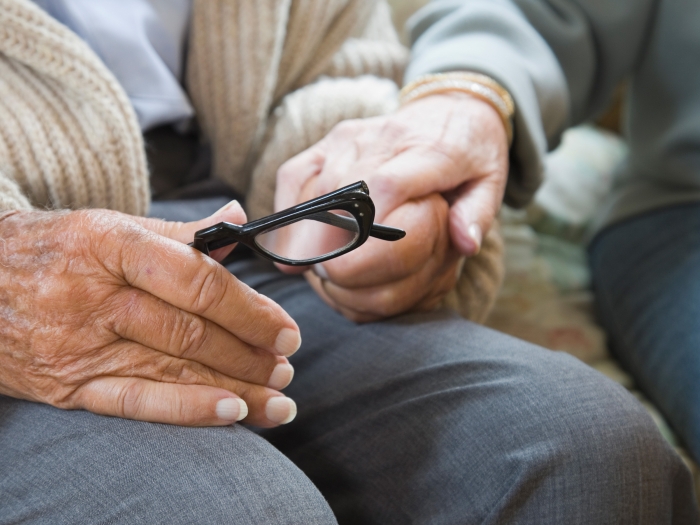It’s hard to heal in your hospital bed if you’re concerned about your pets at home.
12:48 PM
Author |

Tiffany Braley, M.D., M.S., an associate professor of neurology at University of Michigan Health, was surprised when a patient she was caring for explained why they needed to go home from the hospital as soon as possible: their pets.
After she heard several more patients voice concern for their cats, dogs and other animals at home as they sat in the hospital, she soon realized that this occurrence was not uncommon. In many cases, it involved patients who were the sole caregivers for their pets.
"I've had patients with acute strokes explain to me that they needed to get home to their pets, even though it was in their best medical interest to be admitted or remain in the hospital," Braley said. "Through these interactions, it became evident to me that we needed to learn more about the scope of this problem and how we could find better ways to address it."
Braley, who also loves animals, then reached out to fellow animal lover colleagues in neurology, social work, nursing, and U-M's Office of Patient Experience to investigate this question. The first step: learning about pet owner experiences from Michigan Medicine's own patient advisors.
Study results
In partnership with U-M's Office of Patient Experience, Braley and colleagues sent a survey to patient and family advisors who previously offered to help share their experiences to improve the patient experience. The purpose of the survey was to understand how a need to care for animals at home might affect how hospitalized patients follow their doctors' recommendations.
Researchers published their findings in the Journal of Patient Experience.
More than half of the 113 people who responded to the survey (63%) reported difficulty figuring out pet care during their own hospitalization and/or that of a loved one.
Nearly a third reported that pet care needs impacted their decision, the decision of someone they knew, or both, about whether to stay at the hospital when the medical team recommended it.
And 16% of respondents said they know someone who has left the hospital against medical advice to go care for their pets.
"These patients are stressed already; how do you heal or accept staying in the hospital for treatment when you're also worried about the welfare of your beloved pets?" said first author Carri Polick, R.N., a doctoral student at the U-M School of Nursing. "It can be hard if a patient doesn't have a lot of social contacts or family members."
I've had patients with acute strokes explain to me that they needed to get home to their pets, even though it was in their best medical interest to be admitted or remain in the hospital.Tiffany Braley, M.D., M.S.
Although social work is typically brought in to help patients come up with care plans for their pets, they may not be notified until several days into the hospitalization, typically when the situation is urgent, and are usually forced to turn to the patient's social circle for help. Unfortunately, some patients do not have available social support, and there are limitations in what is available for assistance.
"We see a rising need for a formalized services to identify patients early in their course who need assistance with pet care, and a need to provide better resources, before it becomes a crisis and impacts their care or the welfare of their pets," said Braley, the senior author and principal investigator.
SEE ALSO: One in 10 Older Adults Have Gotten a "Pandemic Pet," Poll Finds
The study team notes that, while this study is an important first step, the survey was small and included mostly women and white participants who live in nearby Washtenaw, Wayne and Oakland counties, which could indicate low estimations of the issue at large. To learn more about the overall scope and impact of pet care needs in a larger, more diverse group, the team is now studying people currently hospitalized or in the Emergency Department at Michigan Medicine to explore how pet care needs affect their hospital outcomes.
They've also started talking with potential local partners, including the Michigan Humane Society, to brainstorm what a future foster care collaboration could look like.
"This research is further evidence that pets are truly a part of the family and an important part of how and why we make decisions," said Matt Pepper, the organization's president and CEO. "Here at Michigan Humane, our work has taught us that people will forego their own health and safety for that of their pet. This study reinforces the need for communities to support families inclusive of the pet."
Braley said a pilot program might start by focusing on a specific unit or patient population first – perhaps people needing inpatient rehabilitation, or parents of a child in the hospital who have an animal back at home. That way, the team could start helping people and their pets while they continue learning about the needs.
"Given the importance of pets to human health, follow-on studies are needed to explore how pet ownership impacts patients' healthcare decision-making and outcomes," Braley said. "If there is a link between pet ownership and adherence to medical treatments, I hope that early assessment of pet care needs and implementation of patient-centered methods to meet these needs will become standard of care for hospitalized patients."
Additional authors include Jennifer W. Applebaum, M.S., Caitlin Hanna, Darnysus Jackson, II, M.S., Sophia Tsaras-Schumacher, LMSW, Rachel Hawkins, LMSW, Alan Conceicao, Louise M. O'Brien, Ph.D., M.S. and Ronald D. Chervin, M.D., M.S.
Paper cited: "The impact of pet care needs on medical decision-making among hospitalized patients: A cross-sectional analysis of patient experience," Journal of Patient Experience. DOI: 10.1177/23743735211046089.

Explore a variety of healthcare news & stories by visiting the Health Lab home page for more articles.

Department of Communication at Michigan Medicine
Want top health & research news weekly? Sign up for Health Lab’s newsletters today!





